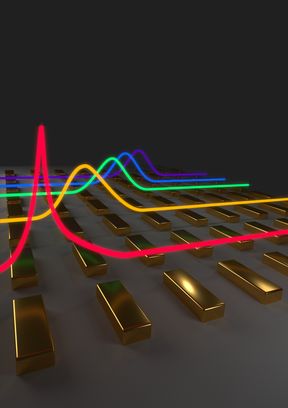Defence of doctoral thesis in the field of applied physics, M.Sc. Antti Moilanen

When
Where
Event language(s)
Plasmonics is the study of the interaction between light and metallic structures at the nanoscale. Metallic nanostructures enable coupling photons to the electrons in the metal, thereby confining light in space smaller than the wavelength. This allows for observing macroscopic quantum-coherent phenomena at room temperature, such as the first Bose-Einstein condensate made of light and electrons observed in this dissertation.
The research in this dissertation focuses on periodic arrays (lattices) of gold nanoparticles that are overlaid with organic fluorescent molecules. When the concentration of molecules is sufficiently high, the lattice resonances can be strongly coupled with the molecules, forming new type of quasiparticles with properties of both light and matter. Strong coupling between light and matter modifies the energy states of both and can therefore, for example, modify and accelerate chemical reactions.
The molecules are excited optically by an external laser. The molecules emit photons into the lattice, exciting optical resonances supported by the array structure. With sufficiently high excitation, the samples produce laser light. Another way to produce coherent light is via a phase transition into a Bose-Einstein condensate. Bose-Einstein condensate is a macroscopic quantum state, where many particles act as one large particle. A luminous Bose-Einstein condensate produces coherent light like a laser, but with properties that differ from conventional laser light.
This dissertation introduces the first Bose-Einstein condensate in a plasmonic system and investigates the properties of the condensate both in the weak and strong coupling regimes. The condensate studied in this work is half a millimeter long, making it reportedly the largest luminous condensate to date. In addition, the dissertation presents a new theoretical model for strongly coupled organic systems.
Room temperature operation, robustness, and high luminosity of the samples provides a promising platform for fundamental studies of quantum dynamics in non-equilibrium systems. The coherent light produced by the condensate can potentially be utilized, for example, in the fields of sensing, optical communications, and quantum information technology.
Opponent is Professor Martin Weitz, University of Bonn, Germany
Custos is Professor Päivi Törmä, Aalto University School of Science, Department of Applied Physics
Contact details of the doctoral student: antti.moilanen@aalto.fi, +358503378457
The public defence will be organised via Zoom and on Campus. Link to the event
The dissertation is publicly displayed 10 days before the defence in the publication archive Aaltodoc of Aalto University






